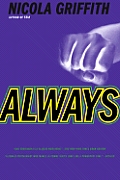
| Series: | Aud Torvingen #3 |
| Publisher: | Riverhead |
| Copyright: | 2007 |
| ISBN: | 1-59448-935-8 |
| Format: | Hardcover |
| Pages: | 463 |
This is the long-awaited third book in the Aud Torvingen series. Although it's not as tightly linked as the previous two novels, it's best to read The Blue Place and Stay before reading this book.
Stay nearly mandated a change of direction in the series, but did set up a major plot hook to follow up on. Always mostly does not do so directly, which surprised me at the beginning of the book. I expected a plot linked to Luz, but that part of Aud's story is kept in the background. On one hand, I was a bit disappointed in not carrying that bit of momentum from Stay, but on the other hand, it means that Griffith could tell an Aud-style detective story without piling more onto the story arc of Stay.
Always is told in two threads: a weekly self-defense class for women that Aud taught in Atlanta, and a later story of Aud investigating fraudulent management of one of her inherited properties in Seattle. The latter thread leads to a real estate racket, sabotage, political corruption, and a wonderfully portrayed relationship. The two threads are only partly linked, but they combine to show a deeper portrait of Aud and her way of viewing the world. Always isn't as tightly focused as the previous two books; it rambles a bit more, shows more of Aud's thoughts outside of the immediate events, and explores parts of her life that we've not seen before. In particular, it adds much more depth to Aud's relationship with her mother, including showing a bit more of Aud's mother's view of that relationship. This makes it less of a compulsive page-turner, but adds more depth and breadth to Aud's already excellent characterization.
The Seattle branch of the story mostly follows a detective plot but with Aud's basic streetwise lack of respect for societal rules. Aud's ability to find unconventional ways of cutting to the heart of something and getting what she wants showcased, as is her occasional blindness to her own feelings, or at least unwillingness to show them to others (including the reader). Aud is so good at some things, mostly around taking control of her environment, and so poor at others (some types of communication and understanding people coming from a far different perspective), that watching her solve problems is like watching someone coming at the world sideways. I love this portrayal of competence. The reader is shown Aud's skills as a biproduct and effect of her choice to approach life and emotion in a very different way, an approach that also makes her life difficult and creates new and different problems that she wouldn't otherwise have.
My favorite part of this book, though, was the self-defense class. Each chapter of the Seattle story is followed by another week's lesson, and even though the two stories have no obvious surface connection and sometimes little thematic connection, the interleaving worked for me. I have some personal interest in self-defense, so the subject material was interesting in its own right, but these scenes are also surprisingly good characterization of Aud. Watching her explain her world-view to others, her sharp observations of her students, the thought process behind her teaching (and her occasional annoyance at the students), and her attitude towards violence is endlessly fascinating. There is a plot behind the lessons to keep the suspense up, but these scenes are mostly driven by character interaction and Aud's observations, and one can see subtle connections between Aud's revealed mindset and the decisions she makes in Seattle. Griffith tackles a difficult task in introducing a ton of characters at once and making them all distinct, turning this into a feature by duplicating the experience of slowly getting to know a group for the reader.
Always isn't quite the intense experience of The Blue Place or Stay. It lacks the gut punch of the former and the deep, stunningly characterized emotion of the latter, and Aud has a few too many resources at her command here for the peril to be as sharp. Aud in Always has essentially unlimited resources, and while this takes nothing away from Griffith's exceptional characterization, it does make some parts of the book feel a bit like a wish fulfillment. Griffith does, however, balance this with relationships and emotional problems where Aud's resources and capabilities are not helpful and even get in the way. Besides, my interest in this series lies not in the plot resolution but in watching in how Aud thinks and approaches the world. I don't believe I've ever found a character as fascinating, even when what she's doing is purely pedestrian.
This is a book primarily for those who liked the earlier books in the series and benefits greatly from already knowing Aud and wanting to learn more about her. It's less traditionally structured and doesn't have the single-threaded driving plot of the previous book, but I thought it gained a different sort of strength by throwing Aud into a strange environment and making her sort out multiple problems at once. If you were reading this series for the plot, you may be disappointed, but if you just want to watch Aud, Always is completely satisfying.
Highly recommended, like the rest of this series.
Reviewed: 2007-05-28